Posted on November 18, 2015 by Sophie Hicks
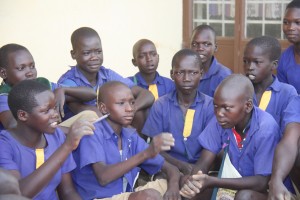 Pupils’ entrepreneurship clubs have also now been established in all 15 schools that African Revival works with through the School Demonstration Garden Project. There are 50 members with equal number of boys and girls in each school. The club members have elected their leaders and are being guided by a teacher from each school. Having selected their crops to plant, which will form their micro enterprises, members are now undergoing training on business planning and management using the School Enterprise Challenge methodology by Teach A Man to Fish. These newly acquired business skills are to be implemented within their school garden project. This practical application will serve as a unique and useful experience for these pupils, equipping them with the skills to flourish in the business of farming, leading to increased professional stability when they leave school.
Pupils’ entrepreneurship clubs have also now been established in all 15 schools that African Revival works with through the School Demonstration Garden Project. There are 50 members with equal number of boys and girls in each school. The club members have elected their leaders and are being guided by a teacher from each school. Having selected their crops to plant, which will form their micro enterprises, members are now undergoing training on business planning and management using the School Enterprise Challenge methodology by Teach A Man to Fish. These newly acquired business skills are to be implemented within their school garden project. This practical application will serve as a unique and useful experience for these pupils, equipping them with the skills to flourish in the business of farming, leading to increased professional stability when they leave school.
Otwe Pupils’ Entrepreneurship Club
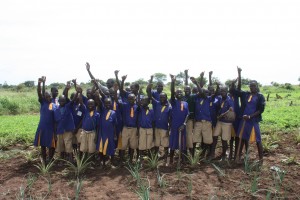
The Otwe Primary SDG Pupils’ Entrepreneurship club is in high spirits. The bean crop that they planted back in March is doing very well, despite a prolonged drought and damage from stray animals. The rain has at last come, and the pupils are seeing the bountiful effects of their hard work. Soon they hope to harvest and have already started to scout out surrounding villages and towns to assess market potential and decide which marketplace will bring them the highest profit. Head of Marketing, Boniface Rubanga, explained in more detail how the club chooses where to sell:
“Me and the marketing team go to the market and ask for the middle man, and if we think that place can fit in our needs, we can choose that middle man to take the produce.
We prefer selling our things in kilos because with these cup things they can cheat you. For Kilos, you can weigh from here and you can easily come to market and know what you are going to get.”
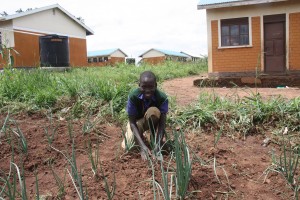 The club has recently received training in marketing skills to support them in this aspect of the project. African Revival Project Officer Babra notes that one of the principle objectives is to enable them to be self-reliant in the future:
The club has recently received training in marketing skills to support them in this aspect of the project. African Revival Project Officer Babra notes that one of the principle objectives is to enable them to be self-reliant in the future:
“We actually train them on how to produce, how to invest, how to add value to the products and how to market it […] our schools are located in the rural areas where the major activities are actually farming but the pupils have realized that the actual challenge faced is the marketing strategy.”
The skills transferred through the Pupil’s Entrepreneurship Club are helping to fill this gap in knowledge and ensure that pupils can effectively handle the post-production and financial aspect of farming.
And some of them already have interesting plans for how they will use the profits from the bean crop, a portion of which will be shared amongst group members (the rest will be added to the group account for future activities). Boniface wants to save his cut with the help of his mother, who is in the Parents’ VSLA group:
“I am in p6 and next year I am in p7. With these savings, it’s going to help me to buy some text books to help me prepare for the national examinations.”
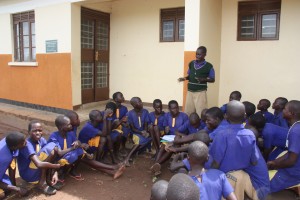 While Boniface has ambitions to become a vicar when he leaves school, he also intends to keep on farming alongside this profession in order to provide his household with a secure source of nutrition, and generate a profit through selling the surplus. As such, the business skills he is learning through the Pupils’ Entrepreneurship Club will continue to serve him well in the future.
While Boniface has ambitions to become a vicar when he leaves school, he also intends to keep on farming alongside this profession in order to provide his household with a secure source of nutrition, and generate a profit through selling the surplus. As such, the business skills he is learning through the Pupils’ Entrepreneurship Club will continue to serve him well in the future.
Posted in News |
Tagged Development, Gulu, School Development, School garden, Uganda |
Leave a comment
Posted on November 12, 2015 by Sophie Hicks
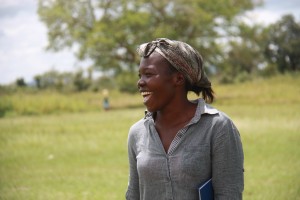 Babra Akello, aged 27, Is African Revival’s Agricultural Project Officer. Originally from Lira, she moved to Gulu together with her husband, with whom she has four year-old twins Jemimmah and Jesse. Babra completed a Certificate in General Agriculture at Busitema University in Soroti district, and is now studying part time for her degree in Agriculture at Uganda Martys University. After roles with the International Institute of Rural Reconstruction and Action Against Hunger, she joined African Revival in January 2012 as an Agricultural Extension Worker, before being promoted to Agricultural Project Officer. Here, Babra tells us more about her role with AR and her long-standing passion for farming.
Babra Akello, aged 27, Is African Revival’s Agricultural Project Officer. Originally from Lira, she moved to Gulu together with her husband, with whom she has four year-old twins Jemimmah and Jesse. Babra completed a Certificate in General Agriculture at Busitema University in Soroti district, and is now studying part time for her degree in Agriculture at Uganda Martys University. After roles with the International Institute of Rural Reconstruction and Action Against Hunger, she joined African Revival in January 2012 as an Agricultural Extension Worker, before being promoted to Agricultural Project Officer. Here, Babra tells us more about her role with AR and her long-standing passion for farming.
In my degree in agriculture I’m learning a lot. For example, the aspects of agricultural development, sustainable management of resources and different techniques of growing crops and handling animals. It’s a broad course.
My responsibilities as Agricultural Project Officer are to ensure that I directly implement African Revival’s project with the beneficiaries in the schools that we work with and to offer trainings in agricultural practices, VSLA and business skills. And also I do represent AR at a parish level, district level and country level. Now, I am implementing the school demonstration garden in 8 schools in Amuru district, so ensuring that all the good agricultural practices are taught and ensuring that what I am training the beneficiaries, they are also learning and replicating at the household level. And with the pupil’s clubs, ensuring that they are taught business models so that they can be well acquainted with the life after school, so that in case they don’t continue with their studies they can be self-reliant and not dependent on their parents.
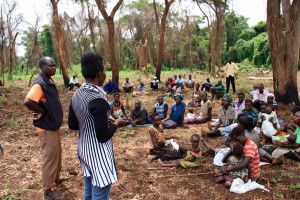 I have done many vocational trainings while working for African Revival and other organisations. I underwent defensive motorbike training. This is more of a safety thing, when you are riding, what you should observe, and actually how to overcome some of the faults or breakdowns in the motorcycle, so you can fix them without taking them to the mechanics. Just to keep you safe when you are driving.
I have done many vocational trainings while working for African Revival and other organisations. I underwent defensive motorbike training. This is more of a safety thing, when you are riding, what you should observe, and actually how to overcome some of the faults or breakdowns in the motorcycle, so you can fix them without taking them to the mechanics. Just to keep you safe when you are driving.
During my free time I like interacting with the children. With my own, but even with other children. The children like me even if I reach home you may not even understand who is my child or who is not my child because every time I am surrounded by children so I just enjoy interacting with them in my free time. The children collect their homework and I actually help them because as a parent, you should guide them. Where we live, there are many children and they are going in the same school, and they converge together and we do it together.
Being a child-centred person, I so much enjoy working with the children involved in the SDG Pupil’s Entrepreneurship Club. I just enjoy focusing on the future of the children. And the other thing I enjoy most is also working with the community that African Revival works with. It is not easy in the north to find parents in the school, but what I like most about our project is that it brings the parents closer to the school, and makes them know the benefit of education. Children can’t move forward without the support of their parents, so therefore African Revival having their projects bring parents closer to the school makes me more interested, and I enjoy it.
When I was younger, I wanted to be a veterinary doctor. In my village, we had only one veterinary doctor, and my father used to have animals, chickens, goats, cows, and each time this vet comes, he would treat the animals and he would be given a big sum of money. And I put into my mind that I must study and become a vet doctor so that I can treat these animals of ours on my own! And I wanted to actually out-compete him in the village so that I could also be the one getting such money from the communities around us. I would not say my dream changed, because I went for a certificate in general agriculture, whereby I also studied animals and crops at the same time, so I can even treat the animals.
I started farming when I was six years old. I planted maize in that first year and I got 13,000 shillings. And I remember my mother brought a chicken with that money, and the chicken multiplied so so much, and it helped me. And then when I was ten, I planted cassava, and it so happened that that year, there was too much hunger by the time my cassava was getting ready, and it helped in sustaining our family – some was sold and some was consumed.
I secured some land in Nwoya, so now I am doing my farming in Nwoya. At first I brought 6 achres, now I’ve added 4, so I own 10 acres with my husband as a family. I have a casual worker, so I am renting for the casual worker, but I plan this December to put up some small house there, so the worker can stay there. I very much want to expand, because with time I want to get back to farming. That’s the plan I have.
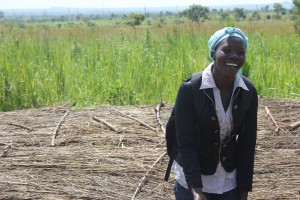 In the future, I want to farm commercially. I want to have a diversity of enterprises. Right now I have some perennials, I have some fruit trees, I have field crops, and I plan to integrate vegetables, so I want to have actually a diversity of enterprises. And soon I want to buy some animals. At the moment I am still using people’s labour in terms of hiring tractors and ox-ploughs. But already I have brought my own plough. So this December I am planning to buy the ox animals so that I do not have to continue hiring and keep more of the profits.
In the future, I want to farm commercially. I want to have a diversity of enterprises. Right now I have some perennials, I have some fruit trees, I have field crops, and I plan to integrate vegetables, so I want to have actually a diversity of enterprises. And soon I want to buy some animals. At the moment I am still using people’s labour in terms of hiring tractors and ox-ploughs. But already I have brought my own plough. So this December I am planning to buy the ox animals so that I do not have to continue hiring and keep more of the profits.
I am very much happy with the role that agriculture plays in my life. Agriculture provides a source of food for myself, my home and income generation. In Uganda, as a whole, agriculture plays a vital role and is the backbone of the country.
Posted in News |
Tagged Acholi, African Revival, Gulu, School Development, School garden, Uganda |
Leave a comment
 Pupils’ entrepreneurship clubs have also now been established in all 15 schools that African Revival works with through the School Demonstration Garden Project. There are 50 members with equal number of boys and girls in each school. The club members have elected their leaders and are being guided by a teacher from each school. Having selected their crops to plant, which will form their micro enterprises, members are now undergoing training on business planning and management using the School Enterprise Challenge methodology by Teach A Man to Fish. These newly acquired business skills are to be implemented within their school garden project. This practical application will serve as a unique and useful experience for these pupils, equipping them with the skills to flourish in the business of farming, leading to increased professional stability when they leave school.
Pupils’ entrepreneurship clubs have also now been established in all 15 schools that African Revival works with through the School Demonstration Garden Project. There are 50 members with equal number of boys and girls in each school. The club members have elected their leaders and are being guided by a teacher from each school. Having selected their crops to plant, which will form their micro enterprises, members are now undergoing training on business planning and management using the School Enterprise Challenge methodology by Teach A Man to Fish. These newly acquired business skills are to be implemented within their school garden project. This practical application will serve as a unique and useful experience for these pupils, equipping them with the skills to flourish in the business of farming, leading to increased professional stability when they leave school. The club has recently received training in marketing skills to support them in this aspect of the project. African Revival Project Officer Babra notes that one of the principle objectives is to enable them to be self-reliant in the future:
The club has recently received training in marketing skills to support them in this aspect of the project. African Revival Project Officer Babra notes that one of the principle objectives is to enable them to be self-reliant in the future: While Boniface has ambitions to become a vicar when he leaves school, he also intends to keep on farming alongside this profession in order to provide his household with a secure source of nutrition, and generate a profit through selling the surplus. As such, the business skills he is learning through the Pupils’ Entrepreneurship Club will continue to serve him well in the future.
While Boniface has ambitions to become a vicar when he leaves school, he also intends to keep on farming alongside this profession in order to provide his household with a secure source of nutrition, and generate a profit through selling the surplus. As such, the business skills he is learning through the Pupils’ Entrepreneurship Club will continue to serve him well in the future.



